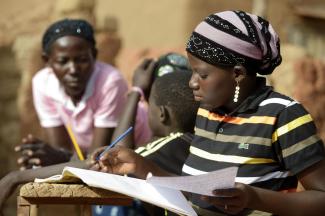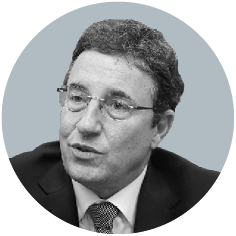UNDP
“Governance is fundamental”

When the UNDP launched the Human Development Index (HDI) in 1990, the guiding idea was to empower people to take their fates into their own hands. Do I remember that correctly?
Yes, but that was not the singular motivation. The Human Development Index introduced a broader approach to advance human wellbeing termed the human development approach. This methodology is about expanding the richness of human life, rather than simply the richness of the economy in which human beings live. The index was a response to the dominant paradigm back then – that is, powerful institutions were simply equating development with economic growth and rising per-capita incomes. That was the era of structural adjustment and the Washington Consensus, both of which were entirely geared towards market dynamics. Human wellbeing did not get much attention. On behalf of the UNDP, Amartya Sen and Mahbub ul Haq, two prominent economists, designed the HDI in a way that took into account important other components that were overlooked – especially education and health outcomes. Both elements are extremely important to a person’s wellbeing. It is critical to measure a country’s progress in these areas to see where there are gaps and address them – to ensure that people can indeed reach their full potential.
Has the HDI changed the development paradigm?
Yes, in many ways the HDI has become mainstream. Consider, for example, the fact that the World Bank launched its own Human Capital Index in 2018, which aims to measure progress in some of the same areas. However, the debate does not stand still, and we strive to improve the concept accordingly. We are now focusing more and more on inequality. Last year’s Human Development Report showed, for example, that more equal societies often outperform more unequal societies. That is true in spite of lower per-capita incomes. For the first time, this year’s report will include an assessment of how inequality and environmental problems are intrinsically linked. It is critical to better understand how issues like pollution or the destruction of ecosystems hurt poor people much more than rich people – and design ways to address this imbalance.
Is human development ultimately the same as sustainable development?
The two concepts are certainly converging, but they have a different history. Human development is more squarely focused on human beings. It was conceived to counter an understanding of development that purely took economic indicators into account. The concept of sustainable development was formulated for different reasons. It was adopted by the UN at the Earth Summit in Rio de Janeiro in 1992 after many years of debate. The fundamental idea is that future generations must enjoy the same opportunities as people do today. One implication of this is the principle that business activity must not damage or destroy the natural environment. However, global warming and the loss of ecosystems and biodiversity is quite obviously harming the outlook for future generations. The Earth Summit also emphasised that the rich regions of the world cannot prosper at the expense of disadvantaged regions. Every human being deserves the same opportunities in life. The three pillars of sustainability, as understood in Rio – social inclusion, environmental protection and the long-term viability of businesses – remain critically important today.
A core element of the Sustainable Development Goals (SDGs) is the principle to “leave no one behind”. Does it make sense to trace the SDGs back to the Earth Summit?
Yes, and we can trace their germination back to previous international debates as well. The UN has a long history of thought leadership in these matters. The Brundtland Commission was very important in the late 1980s, as was the Brandt Commission in the early 1980s.
To what extent is improved governance – at national as well as global levels – essential to achieving the SDGs?
Governance is absolutely fundamental. It is about how we interact with one another. It is about fairness, rule of law, values and so on. The rights of individual persons depend on governance. That also applies to the rights of minorities and other vulnerable groups. However, it is difficult to measure the quality of governance, not least because there are ideological differences. Nonetheless, the SDGs reflect a multilateral consensus. By using them as the yardstick, there is actually some scope to measure how effective countries’ governance systems are. Apart from governments, many other actors have to play their part in governance, of course – from the private-sector to civil-society organisations or research institutes. Governance is about more than just government action, and that is especially true at the global level. We do not have a “world government”, but we do have governance systems that regulate many important things from telecoms and postal services to trade and maritime safety. The Covid-19 pandemic proves once again how important global governance is. Unless we work together to contain the virus everywhere, it is liable to re-emerge and spread rapidly again. Indeed, an economic slowdown in one part of the world will have a major knock-on effect and hurt other regions of the world. If we want the world economy to recover, we will need stimulus programmes for every country – not only the prosperous ones.
Is the global governance system up to task?
Let me say first that the system is remarkably strong. Don’t forget that its institutions were largely built during the Cold War. In spite of that era’s fundamental tensions, multilateral institutions grew, and today, they are managing important tasks quite successfully. It is true, however, that the multilateral system faces considerable constraints. It is somewhat remarkable to consider that the budget of the UN Secretary-General is about the same size as the budget of the New York City Fire Department. It is hard to deny that the multilateral system is underfunded. The UN Security Council should have been reformed many years ago for its membership to better reflect current power relations. Moreover, we need increased respect for international law. Indeed, a renewed commitment to global governance would be a welcome development.
But many governments now emphasise sovereignty and want to put their nations’ interests first.
Well, it is a false dichotomy to try to choose between global governance and sovereignty. Global governance benefits all nations – and it does not require a country to surrender sovereignty. On the contrary, global governance results from sovereign countries joining forces to rise to challenges together. The plain truth is that countries can only achieve certain objectives through cooperation – aims which are impossible if they go alone. Indeed, the great challenges that humankind now faces, exceed the capacities of every single nation state. Most notably, no country can manage the climate crisis on its own. And world trade and the global financial architecture require cooperation. The rapid spread of Covid-19 and its lack of respect for borders is a stark reminder of this fact. Crises will keep getting worse unless we can rely on strong, respected and effective global institutions.
I’d like to return to where we started. It seems to me that the paradigm that equates growth with development is still quite strong. To some extent, it even marks the SDGs which emphasise the importance of private-sector businesses and market dynamics. Does that not fly in the face of human development?
No, not really. It is another fallacy to believe that we must choose between economic prosperity and environmental sustainability. That is something the experts agree on. Economies can – and must – develop further without destroying the environment. Germany is actually a good example of development that is not purely linked to economic growth but rather, it is about fostering green growth and sustainable development. The country’s performance in the past ten years or so has been good. There was full employment before the Covid-19 crisis began, but the growth rate was actually very disappointing in comparison with previous decades. The more an economy matures, the less important growth becomes. Nonetheless, many policymakers in all countries, are stuck in the old growth mindset. Too many finance ministries around the world still do not have an office or at least an expert team to assess environmental sustainability issues. Once again, more, not less cooperation in this area, is the best way to make progress.
Some critics say that the entire notion of development is toxic because former colonial powers are imposing their will on the rest of the world. They say humankind needs a fundamental “restart”. What is your response?
I think that this is a mostly hypothetical reasoning without much relevance to what happens next in our world. Throughout history, different cultures have interacted with one another. There was a constant exchange leading to both opportunities and risks. It is impossible to go back in history and start from scratch. We must work together to meet the challenges that our species is collectively facing right now – most notably climate change.
Achim Steiner is the Administrator of the United Nations Development Programme (UNDP).
https://www.undp.org









